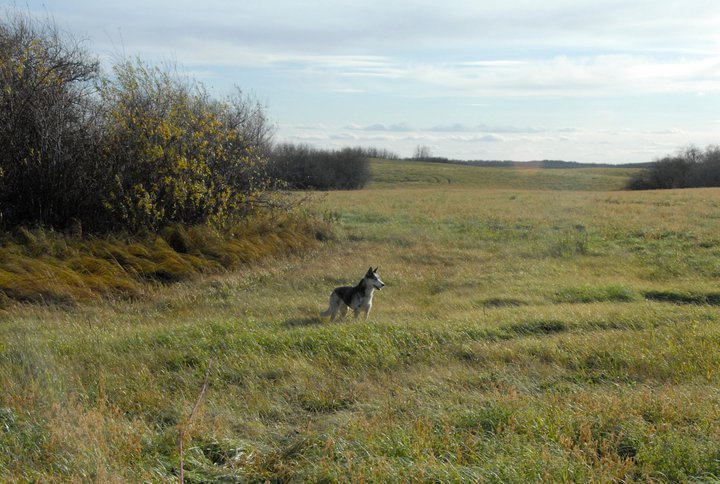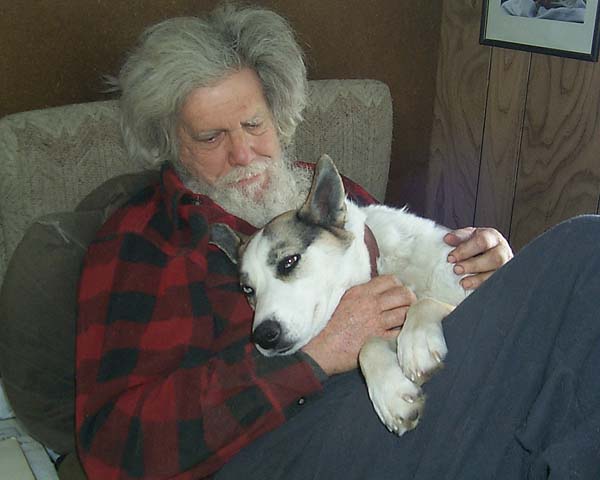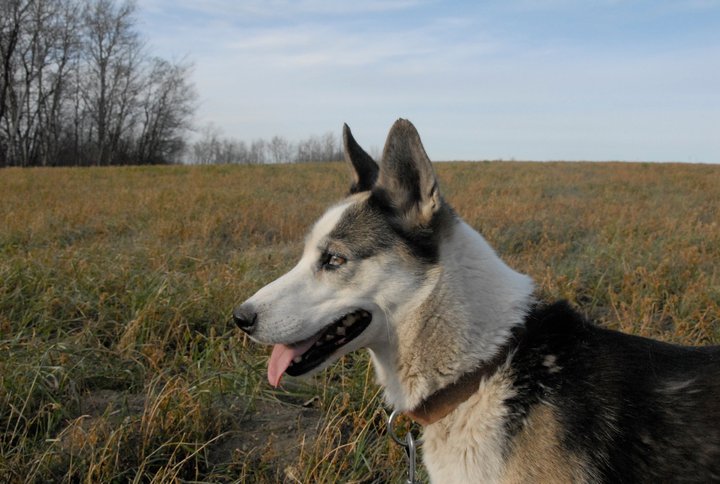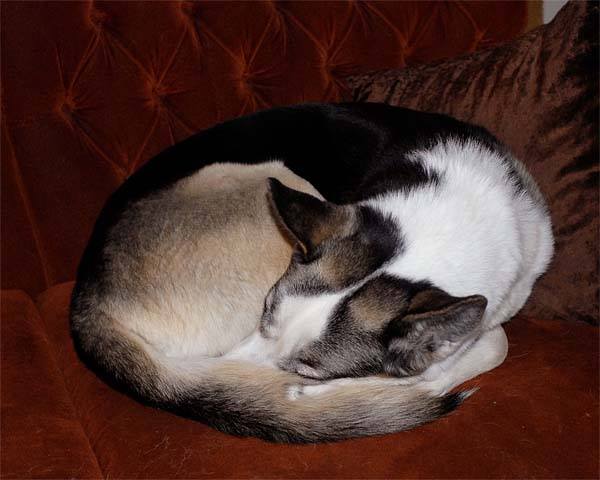 In Memoriam Lizaveta of Seppala 2 November 2002 — 11 August 2018
In Memoriam Lizaveta of Seppala 2 November 2002 — 11 August 2018— "A leash is only a rope with a noose at both ends." (Ayn Rand, "The Fountainhead")
—"Vera quae visa; quae non, veriora." (The things that we have seen are true; those not seen, truer still.)
THERE WAS A TIME when I would take Lizzy walking. Lizzy was my long-standing personal companion and ex dog team leader. I would snap her "twing" (a twelve-foot braided rope) onto her collar and off we would go, Lizard leading the way as a well-trained leader will do. Particularly after the death of Tonya my senior leader, the Noble Lady and kennel Queen, Lizzy and I became inseparable. Tonya's niece, she was seven years her junior, a fine leader who was taught her trade by Tonya herself. After Tonya was gone, Liz and I went everywhere together. In fact, I clung to her desperately not to go off the rails in the wake of the loss of Tonya.

Walking the dog then was just walking the dog, a simple straightforward matter. Those walks concealed no ulteriority beyond good exercise for me and for Liz and the good feeling of being together on field, road or trail. Lizzy gave me seven more years of walks and companionship and then failed; she outlived Tonya by a mere ten days. That last year she could no longer jump up into the high cab of my 4wd pickup truck, she would put her forepaws up against the bench seat and I'd give her a boost from behind. Then she could no longer walk up the three porch steps to enter the house; finally she could not walk at all — and died of bone cancer on the hottest day of that summer.
Today sixteen months later I'm still walking the dog. There are, however, some important differences. Things are not now as they once were. It's always somewhat strange, at times disturbing. How do you go about walking a dog that is not visibly present?
The mercury on this occasion stands at minus 15 Celsius; not too bad if you're dressed for it, but there's a nasty windchill. I emerge from the house in my heavy grey hunting camouflage polar-fleece parka, its hood Yukonised with a strip of wolverine fur. (I've had that parka for twenty-five years, drove Tonya's Seppala teams in it on the foothills of the Miners Range beside Lake Laberge, twenty miles north of Whitehorse.) In my left hand I carry Lizzy's twing, neatly coiled and secured by a tied bit of cord. The purple collar she once wore encircles my right bicep, as it has done for 99% of the time that has elapsed since her death. The long line and collar are "material links" to my lost Lizzy — as the magicians and wicca folk would say.
As I turn toward Tonya's grave site I hear a loud raucous croak. As I cross the lane to pay my respects to the Noble Lady, her nagual spirit raven appears at the very top of one of the tall shelter-belt spruce trees just north of the house and yard. The raven launches itself into a broad spectacular semicircular flight, initially southeasterly towards Tonya's grave and me, then circling to the south to disappear finally into the west. That feels somehow ominous and disquieting but as always the raven is a sure harbinger of Tonya's active and immediate presence. I turn to her oval of pasture stones with the oddly-tilted altar stone before it, sing her little song, pay my respects and invite her to come along on the walk, or not, at her majesty's sole pleasure as always. (It's almost impossible to tell when or whether she does; Tonya usually betrays no sign of her presence.)
I take up Lizzy's twing and head north up the farm lane to the grid road called Road 120N that borders our property to the north. Disconcerting, the raven's ostentatious appearance and dramatic aerial dance unmistakably pointing out the West. The vastness. The sunset land. I am wary of walking westward; that might be tempting Thanatos so I turn to the east as we leave the lane.
It's plenty cold enough for me. I can't see much landscape through the fur-edged tunnel of my parka's hood. I just trudge along with an invisible Lizard out front, walking the dog, and thinking, none too coherently. Thinking about Thanatos. Thinking about loss. About Lizzy and Tonya. What does one do about a loss so absolute and profound that it must be denied with one's very behaviour, because it can never be accepted? Here am I, walking a dog (or is it two dogs, if Tonya has chosen to come along) of whose presence there is not a shred of evidence. This is behaviour that, if carried too far, becomes not just patently ridiculous, but suggestive of mental disorder. De-emphasise it a bit and it may perhaps be excused as mere eccentricity of old age. Nevertheless, it's clearly an emotional weakness.
The loss of Tonya, the loss of Lizzy, these losses seemed stark and absolute to me; yet reason says they are relative, small losses, compared to catastrophes on the cosmic scale, let's say for example the burning up of our entire planet if our sun should exit the main sequence and go supernova, or yet more comprehensive and final, the entropic heat-death of the entire universe. Surely in such context the death of a dog — or a human, or any number of either — no longer has much meaning, becomes without overall significance, the fine detail of small personal tragedies no longer distinguishable against the backdrop of final cosmic ruin. But that's just the mind doing its number, reasoning about stuff it can't really handle. Maybe I should be meditating more to help me cope.
I do a few rounds of Gayatri Mantra to calm and centre myself. It's an old familiar for me, a reliable friend. Serenity, that's what's called for here.
|
OM bhur bhuvah svah |
(OM earth atmosphere heavens |
The light this afternoon is far from sacred. There's little sign of any effulgent source, just a uniform dull overcast. A few insignificant snowflakes fly in the chilly wind. No transcendence. But perhaps a slight increment of serenity, no? The rhythm of the mantra falls in with my rhythmic trudge as, wind and dry little flakes raking my face through the opening of the parka's hood, snow-booted I determinedly put one foot ahead of the other going east on unploughed grid Road 120N through four to six inches of snow — walking the dog.

I approach the eastern end of 120N where it makes a tee intersection with Road 138.5W. Here I must unavoidably turn around and walk westward if I want to return home, for Thanatos now lies eastward for sure! If I continue on my present line of travel, I shall go over snowy untracked hill and dale for half a mile and then enter the bounds of Riding Mountain National Forest Park, trail-less winter bush country with no landmarks and abundant big game animals (moose, elk, deer) and predators (black bear, wolves, cougars even). A person of my age and indifferent physical condition would not survive long in wilderness environment in this cold. I might experience my own personal and private heat-death. I, too, could be Lost. This might be as good a day as any for a final escape from the disappointments, disillusion and creeping infirmities of old age. I could do it. Lizzy would go east with me, at my side to the last, I'm sure, but I think she's relieved when I turn to face homeward. I doubt she's that starved for company on the other side (wherever that might be). There are a gracious plenty of her fellow Seppalas "waiting at the Rainbow Bridge" as some would say. No, Lizzy's task appears to be to stick tight to her Boss and look after me as best she knows how, much as did her grand-dams Dreama and Sprite... twenty-five years ago in the Yukon... when my old grey Trebark parka was new.
As I begin to trudge westward, walking the dog, still brooding about Thanatos and loss, suddenly bursts on my consciousness the effulgent sound of a choral prayer known as the Trisagion Hymn! I heard it just once over fifty years ago, whilst visiting the Greek Orthodox church of a college friend:
Agios o Theos, Agios Ischyros, Agios Athanatos, eleison imasAgios o Theos, Agios Ischyros, Agios Athanatos, eleison imas
Agios o Theos, Agios Ischyros, Agios Athanatos, eleison imas
("Holy God, Holy Mighty, Holy Immortal, have mercy on us")
Stunned by this involuntary offshoot of word-association I listen to the heavenly Greek girls' choir in my mind's ear. What does this mean? Is it the flip side of Gayatri Mantra? Who's this Agios Athanatos, this Holy Immortal anyway, some Jungian archetype? (Personally I suspect Carl Jung and George Gurdjieff were both shipped in the same crate; The Red Book or All and Everything, just take your pick.) I ask Lizzy jokingly if she has become an archetype — I get an immediate and surprising response:
Liz: "No, that's Tonya. You made her into that."
Fair comment, I guess. Ask a stupid question, get an embarrassing answer.
Liz: "You did that with your dumb Elegy. She's always bitching about it. Please Boss — don't do that to me! I just wanna walk with you and stay with you and sleep by your pillow and look after you. Don't wanna be no mythic archetype thingy."
I thought I was losing it just after Tonner died, calling and searching for the lost dog who wasn't to be found. Now I'm having peripatetic conversations with the long-gone and usually silent Lizard! Maybe eight years on I'm quite a bit further down the pike to insanity. I don't know. Never argue with a Seppala — they are both stubborn and clever, devious. The less said the better is a good rule with them.
"Holy Immortal, have mercy on us." Actually the version I heard fifty years ago was a variant in which the third repetition ended with a slightly different petition: "soson imas," save us. I know that particular church used the Liturgy of St. John Chrysostom. I've checked the text online but found only the threefold "have mercy on us." A search failed to turn up any Trisagion version ending with "soson imas"; was it perhaps a penitential variation, some artifact of the liturgical year? I did find "soson imas" elsewhere in the liturgy, generally addressed to the Theotokos ("God-Bearer," the usual Orthodox honorific term for the Blessed Virgin Mary).
There's a long, ominous stretch of dark territory between "have mercy on us" and "save us." Having mercy could mean just a quick death in a hopeless case, an euthanasia. (Yes, there's Thanatos again, the old Greek word does keep showing up.) As for saving us, well, that seems to be asking a lot. Assuming — on no particular evidence — there is Anyone there Who is capable of saving us, or might care enough first to notice we need saving and then to undertake such an unpromising project. We take an enormous lot upon ourselves just to imagine that the universe — let alone its presumptive Creator — takes any notice of us with our self-generated miseries and problems. The staggering pretentiousness of the religious stance — that the human inhabitants of this one particular planet are a top-level priority with the Creator of the universe — makes me want to hide my head under a pillow for sheer embarrassment. Sin. Atonement. Redemption. Salvation. Who, us? Out of 3 x 10^23 (300 sextillion) stars and something like 10^24 (or more) planets, always assuming current estimates, which change often, are anything more than more pretentious pseudo-scientific bullshit. Do we — suffering humanity — really stack up as having any shred of significance, let alone importance, in the cosmic purview? In that perspective it seems to me we might just as well be E. coli bacilli. OM Bhur Bhuvah Svah... try to stay sane, old boy.
Liz: "Yes, Boss. I worry when you get like that."
Tat Savitur Varenyam... try to grab some serenity, it's the brass ring on the cosmic merry-go-round and if you miss it, it's a lo-o-o-ong way down. Serenity — sigil and ward against the suffering and pain of loss. That, just like the inevitable turning to walk westward to get back home, brings me right back to my own stubborn enigma of loss, the reason why I'm walking the dog who isn't visibly there, not present to my sensorium; back to the central question, to my own personal rock of stumbling and offense. (Web searches reveal that this question is apparently mine alone — no one else publicly admits to asking it, no one even appears to acknowledge its askability!)
"How can anything be real and not be eternal?" ("Elegy for a Fifteen Year Old Sleddog" line 350 or thereabouts)
If it was real but it's lost and gone now, how can you prove it ever existed? (Photographic and almost any other kind of evidence can be faked these days.) If it seemed real then but is not real now, was it delusional, illusory? To my mind, at least, anything that "was real then but is not real now" sounds suspiciously like a myth, a fairy tale — or a religious scripture, part of a belief system. What else can be said of something supposedly real that nevertheless cannot be shown or demonstrated?
"Nothing real can be threatened. Nothing unreal exists." And therein lies the peace of the presumptive Thrice-Holy. ("A Course In Miracles," title page epigraph.) It sounds like a unshakeably solid logical proposition, but it has far-reaching and disturbing implications. Anything that can be lost or even threatened would then by definition be unreal. Anything beyond threat, invulnerable, would have to be non-ephemeral, everlasting, i.e. eternal. That is a stunningly Non-Dualistic, Vedantic stance for a "scribed" book with a covert Jesus as the purported real author. But is the foregoing proposition demonstrable? I have my doubts there.

"I" — "experienced" — "something." (Probably none of those three terms can be given satisfactory — airtight, unbreakable — definition. We're operating in the shadowy borderlands of the limits of language here.) What I experienced, I called a dog. I gave it a personal name, Lizzy, because I experienced far more than just forty pounds of meat bone and fur, I experienced a person, a canine personality with definite observed — and observable — characteristics and character traits. That personality was observable for nearly sixteen years. "Now" — whatever that is — it is no longer observable, like one of those stars that has mysteriously disappeared from astronomers' sky mapping. Yes, I remember it, but that which I remember is at best an abstracted summary, a précis, at worst a caricature or little better than something merely imagined — not the sweet unblemished self-coherent whole that was Lizzy, not the real deal.
It was real then. It is not now. Only an emotionally charged simulacrum remains in my heart and mind. I might as well be hallucinating. Probably I am. I can't accept losing her, so I imagine a Lizzy who isn't there and then have bogus conversations with her. Was Lizzy ever real? Or was she just an illusion always? How do we know that what we experience is "real"?
Me: "Were you real, Lizzy?"
Liz: "Yes."
Me: "Then who or what were you — are you?"
Liz: "You."
Me: "Oh, come on now! What do you mean by that?"
Liz: "I am you. You made me. And you perceived me."
Me: "But what does that mean? What does that do to me? Am I supposed to be some sort of grandiose silly solipsist, with all and everything proceeding ever and only out of my own sweet ass?"
Liz: "It makes you the Creator, Boss. You're the Trisagion guy. And excuse me for saying, but you really do need to have mercy on yourself. You take everything too hard, Boss. Life's a zero-sum game — everything you get you gotta give back! You'll never get out of it alive, old chum. But at least you might try to stay sane."
Me: "Yeah, you don't help much with that. This conversation is driving me nuts. But hey, I'm not going to hold still for this Creator jazz! I'm sure I didn't make the horrendous mess that is this world. I refuse to be held responsible! I won't wear it, you hear me, Lizard?"
Liz: "Go ahead and reject it, if you like. Then you'll fit the archetype even better, you can be the Deus Absconditus who made the whole show and then bugged out! That exit is already blocked, Boss. You're stuck with the Creator role. You can't prove you didn't make it all — or make it up. You perceive it all with your eyes and ears or you'd never notice anything, you interpret it with your own human brain or it wouldn't make any sense. You can't get around any of that. What you perceive is created as you perceive it and think about it. Didn't some guy say "nothing is but thinking makes it so"? You have no way of knowing what, if anything, is really out there beyond or behind your senses, or whether it does or doesn't jibe with what you perceive. Boss, enough already! Don't make me do this! I hate all this talking stuff. This isn't doggy way."
Me: "Just as well, I guess. I can't really believe you could tell me all those things. So I must be making it up as I go."
Liz: "Natch. Like I said, you're the Creator, Trisagion guy!"
My clumsy, booted, trudging stride shortens as we go uphill nearing the head of our farm lane, the dodgy westward leg of this most un-serene walk nearly done. Swinging the coils of Lizzy's twing slackly at my side, silently I wish that it could be strung out taut before me, vibrating to the momentum of her former forty pounds of sleddog muscle and bone.
Liz: "Boss."
Me: "Huh?"
Liz: "Boss, I would pull my twing out front if I could. Except now I can't do that any more. Just can't, it doesn't work, like you can't fly like a bird no matter how hard you flap your arms up and down. I'm sorry. I wish I could still do it for you. I know it meant a lot to you."Me: "That's silly. No need to apologise, you're lost and gone. I'm just hallucinating today."
Liz: "Boss, I don't want no argament. But I gotta tell ya, you trusses your eyes but not your heart. It hurts when you don't believe I'm here. I've been right here all the time since that hot day when my poor old body gave out. There's my collar on your arm, what you call your "material link," and I've never been more than my twing's length away from it. Where would I go? Tonner told me to stay here and look after my Boss and I'm doing that. Please don't call me lost coz you trusses your eyes but nothing else. I'm still here. I won't go away."
My vision clouds with a few cold tears as I turn into the lane and return to the house in moody silence. Tonya, I guess, silently returns to the small spirit-house beside her grave; I have a feeling she has observed all this, as always without comment. And I know now — know like Carl Jung said he knew God — who it is that walks beside me up the porch steps, into the house, and down the stairs into the basement, who has always been no more than twelve feet away from my side, who has more fidelity in her right forepaw than I've got in my entire body and mind. Conflicting thoughts and emotions jostle in my consciousness as I build up the fire in the wood furnace, but the one that wins out is just this: I don't feel worthy of her, but I'll be walking the dog with Lizzy for the remainder of my life. At 75 years old, that should not be an unbearable span of time. Then perhaps we can be together again for good with no more doubts, no more "lost," and no more frustrating conversations.

 Lizzy sleeps
Lizzy sleeps